 Our Hamilton
Historical Places
Our Hamilton
Historical Places
~~~~~~~~~~
THE TOWN OF HAMILTON
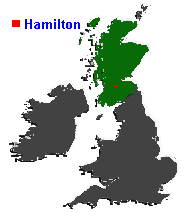
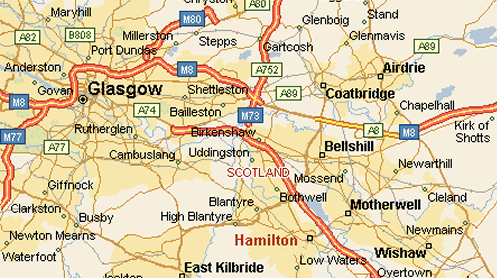
|
HAMILTON FAMILY | HAMILTON TARTANS | HAMILTON HISTORY SHAWS IN AMERICA |
 Our Hamilton
Historical Places
Our Hamilton
Historical Places
~~~~~~~~~~
THE TOWN OF HAMILTON


The name Hamilton means 'beautiful castle', 'Cadihou', in the original Celtic language. King David I of Scotland made Cadzow a Royal Barony in the 12th century.
Later King Robert the Bruce gave the Barony to Walter FitzGilbert of Hameldone. One of Walter's descendants married into the Scottish Royal Family and was created Lord Hamilton. The name of the family manor in Cadzow was changed to 'Hamilton' by Royal Charter in 1445. 'Cadzow' gradually faded from the map and Hamilton came into focus.
In the next century Mary Queen of Scots came here to confer with her ally the Marquis of Hamilton before the disastrous Battle of Langside. The town was later put to the torch as a reprisal for the Hamiltons' loyalty to Mary.
The years moved on. Oliver Cromwell briefly set up his military headquarters here.
A generation later, the nearby Bothwell Bridge echoed to the clash of battle as the Covenanters suffered a crippling defeat and fled for refuge into the woods of Hamilton Palace. Amid the turbulent swirl of history, the townspeople and country-folk quietly got on with the less dramatic business of earning a living. Farming, spinning, lace-making and weaving were among the thriving local industries. Coal mining had begun as early as the Middle Ages. Meanwhile the Hamiltons continued to dominate the local aristocratic landscape.
BOTHWELL CASTLE
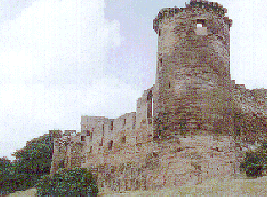
Just a few miles to the north of Hamilton lies the village of Archibald The Grim named after the 3rd Earl of Douglas, Archibald was the man who founded the Church of St Bride in 1398. As you approach Bothwell, the church's 19th century sandstone tower rises above the huge Gothic buttresses and the original roof. The roof is unique, it's covered in heavy stone slabs.
In fact, the choir walls are reckoned to support a weight of no less than 500 tons! They've been doing this for nearly 600 years, so don't hesitate to come in and view the rewarding interion
Interesting features include an elaborate monument to the 3rd Duke of Hamilton, a window by Burne-Jones, and the grave-slab of Walter de Moravia, the builder of Bothwell Castle.
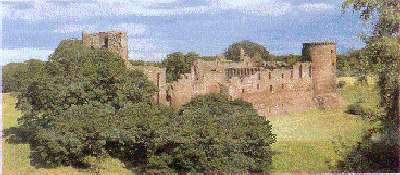
When 'Walter de Moravia laid the foundations of Bothwell Castle several centuries of violence and bloodshed were to be set in stone. The fortress was captured and recaptured by both the English and the Scots during the Scottish 'Wars of Independence. And at this time 'Walter FitzGilbert was to demonstrate his finely sharpened survival skills.
FitzGilbert was actually governing the castle for the English. He surrendered it to Robert the Bruce's forces after the Battle of Bannockburn. His reward - the Barony of Cadzow.
The castle itself was soon dismantled, then rebuilt, then destroyed again. Now it is a magnificent red sandstone ruin set amid woodland, high above the steeply sloping banks of the River Clyde.
Widely regarded as the
finest building of its type in Scotland, the castle is dominated by towers
and curtain walls. The sheer size is breathtaking - and yet, amazingly,
what you see is only a portion of what was originally planned.
BRODICK CASTLE
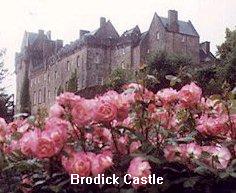
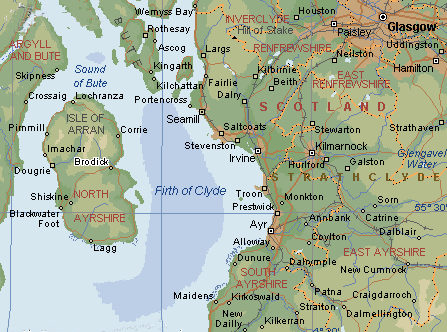
The site has been occupied
by a stronghold of some kind since the fifth century, when an ancient Irish
tribe came over and founded the kingdom of Dalriada. It was probably destroyed
and rebuilt many times during its turbulent history. In 1503 the castle
and the Earldom of Arran were granted by James IV to his cousin, Lord
Hamilton. That structure was demolished in 1544. Parts of the present
castle date from the 1588 during the ownership of the 2nd Earl of Arran
who
was the guardian and
regent of Queen Mary.
As the home of the Dukes of Hamilton, the castle was occupied by Cromwellian troops after the first Duke was executed during the Civil War in 1648 and the second died in battle just three years later. Brodick Castle eventually passed into the hands of Mary, Duchess of Montrose (daughter of the 12th Duke of Hamilton) who revitalised the gardens. Since her death in 1957 it has been owned by the National Trust for Scotland.
Inside are paintings,
porcelain and furniture from the various owners. It is also home to the
art collection of 18th century author William Beckford of Fonthill whose
daughter married the 10th Duke of Hamilton. One of the rooms is known as
'Bruce's Room' but since the castle was all but destroyed in 1455 and 1544,
it is unlikely that Robert the Bruce actually stayed in it.
LENNOXLOVE
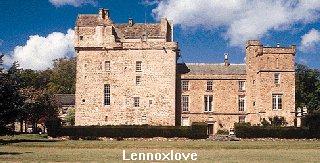
This mellow and romantic
house in the beautiful East Lothian countryside is packed with Hamilton
treasures and portraits from the past. Most prized is the 15th-century
French silver casket given to Mary Queen of Scots by her first husband,
the Dauphin of France. This is the famous casket said to have contained
the incriminating letters that led to her sentence and subsequent
execution.
|
HAMILTON FAMILY | HAMILTON TARTANS | HAMILTON HISTORY SHAWS IN AMERICA |